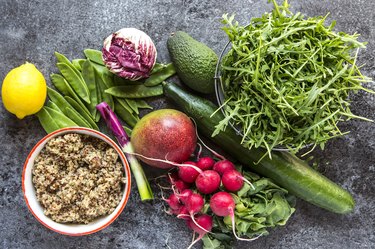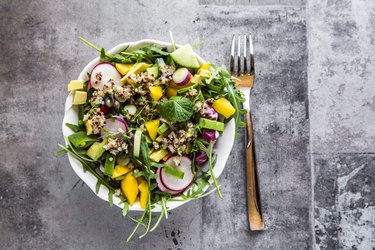Whether they're popping a supplement or sipping on kombucha, everyone is buzzing about probiotics. But did you know that their less-hyped cousin, prebiotics, are actually just as important for good gut health and supporting the probiotics naturally occurring in your gut?
It's true. Amy Shapiro, RD and founder of Real Nutrition, broke it down for us like this: "Both are important," she explains. "Probiotics are the healthy bacteria [in your gut] that help you fight off disease [and maintain gut health], and prebiotics are the food they need to stay alive. They [both] work well to amplify health and wellness."
Video of the Day
Video of the Day
Still confused about prebiotics? We asked Shapiro all our pressing questions, including how taking a prebiotic supplement like Benefiber's new Healthy Balance Prebiotic Fiber Powder works to boost gut health.
Keep reading to learn why you need to start taking prebiotics ASAP, how they work, and all the benefits of stepping up your fiber intake.
How does fiber factor into the gut health equation?
Lets start with fiber. Dietary fiber is the part of food that your body can't break down. As this undigested food travels through your intestines, it helps keep things moving, but it also works to maintain healthy bacteria in your gut. So if you experience things like constipation, SIBO (small intestinal bacterial overgrowth), high cholesterol, blood sugar spikes, or weight gain, these could be signs that you're not getting enough fiber in your diet, according to Shapiro.
The best way to get it is through your diet—and supplements count. Shapiro recommends upping your fiber intake to 25 to 30 grams per day, whether that's through fibrous foods or a supplement like Benefiber's Healthy Balance. The key, however, is to slowly build up your intake, and be sure to drink lots of water to keep things flowing.
And what exactly are prebiotics?
Prebiotics are a type of fiber. "Prebiotics are nondigestible food ingredients that help to promote the growth of healthy bacteria that live in your gut," Shapiro explains.
Your healthy bacteria (probiotics) break prebiotics into nutrients they can use to support themselves and your gut health. You can find them in lots of fiber-filled fruits and veggies (think asparagus, artichoke, jicama, berries, bananas, and hearts of palm).
How do prebiotic supplements work?
Some of Shapiro's favorite sources of prebiotics are fruits and vegetables, but she notes that if you don't have access to the right kinds or aren't able to get enough fiber from food, supplements can come in handy.
Benefiber Healthy Balance comes with similar benefits of eating food-based prebiotic fiber—supporting your good bacteria as well as helping to relieve occasional constipation and abdominal discomfort—in a tasteless drink that won't cause diarrhea (which can be a side effect of consuming too much fiber for some people). Because sometimes the convenience of a dietary supplement is key to maintaining that balance.
What are some signs your gut health is on track?
If you've been diligently tracking your prebiotic and probiotic intake, you obviously want to see the results. You'll know it's working if you, well, feel amazing. According to Shapiro, depending on the prebiotic fiber and/or the probiotic strain you use, signs to look out for are better digestion, improved regularity, and less cravings. Score one for prebiotics and good gut health.
Is this an emergency? If you are experiencing serious medical symptoms, please see the National Library of Medicine’s list of signs you need emergency medical attention or call 911.

